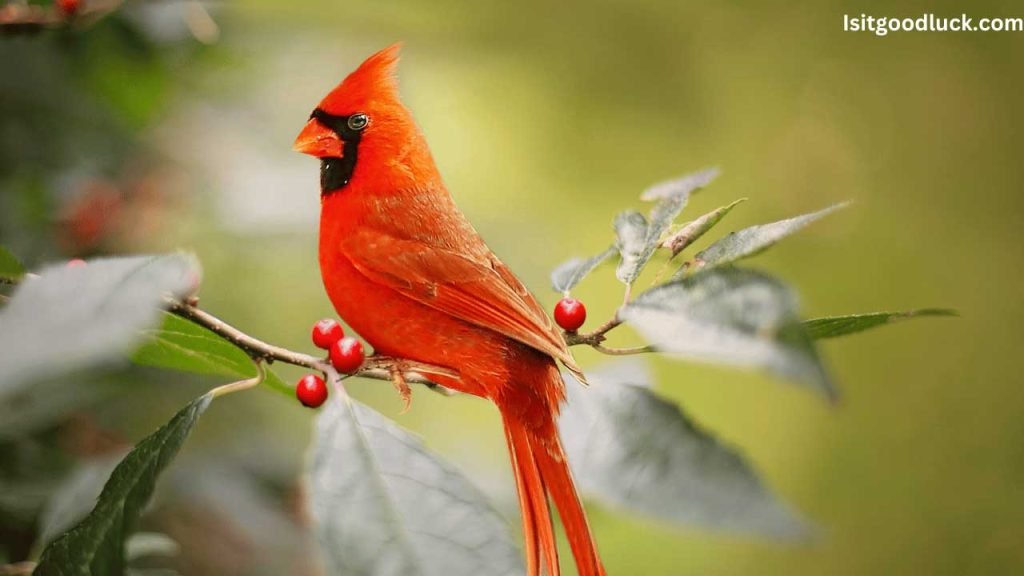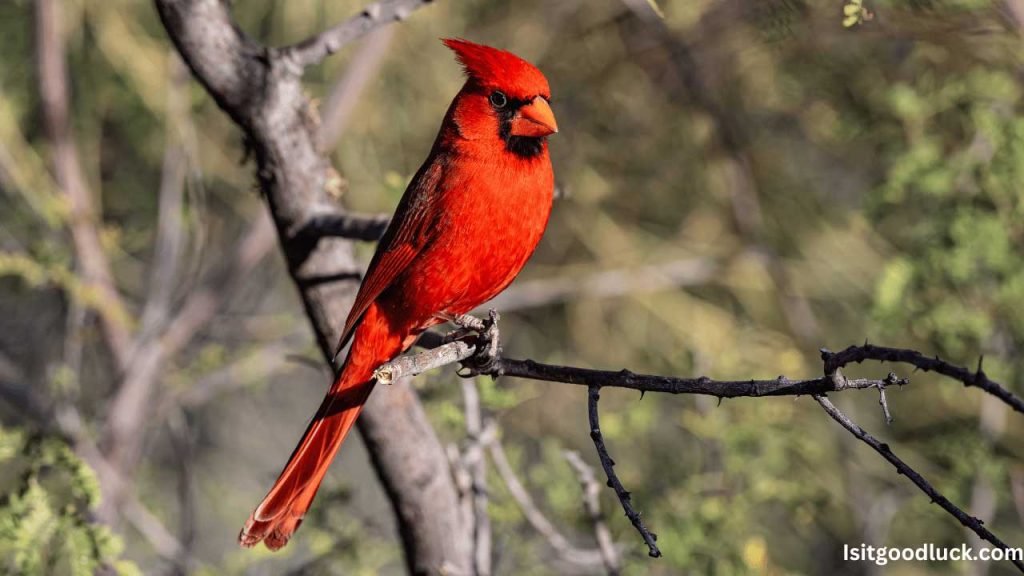Have you ever spotted a brilliant red bird in your backyard and felt an inexplicable surge of joy or a sense of comfort?
Such encounters sometimes feel so extraordinary that we attribute deeper meanings to them. This blog post’ll explore one fascinating question: “Is it good luck to see a red bird?”
We’ll delve into the symbolism of red birds, uncover the significance of seeing them, touch on the scientific explanations behind such beliefs, and discuss how we interpret these enchanting avian encounters personally. Buckle in for a captivating journey that straddles the mystical and scientific realms!
Contents
- 1 The Symbolism of Red Birds in Different Cultures:
- 2 Is it Good Luck to See a Red Bird?
- 3 The Scientific Explanation for Seeing a Red Bird:
- 4 Interpreting the Sight of a Red Bird:
- 5 Some Other Good Luck Symbols Related to Red Birds:
- 6 Conclusion:
- 7 FAQs
- 7.1 Q: What kinds of red birds are considered good luck?
- 7.2 Q: Is there a specific time or place when seeing a red bird is considered lucky?
- 7.3 Q: Are there any superstitions related to red birds?
- 7.4 Q: Do red birds symbolize good luck globally?
- 7.5 Q: Are there any rituals or practices I should follow after seeing a red bird?
The Symbolism of Red Birds in Different Cultures:
Colors carry different meanings across cultures, and red is no exception. Often associated with passion, love, and good luck, red is a vibrant hue that can hardly escape notice. And when it graces the feathers of a bird, the intrigue doubles.
In Native American cultures, red birds are seen as messengers from the spirit world. Cardinals, often called ‘red birds,’ are especially significant due to their bright, fiery feathers.
They are considered a bridge between the earthly and spiritual realms, bearing messages of guidance, protection, and blessings. In these cultures, the sight of a red bird is often a harbinger of good news, a signal that the spirits are watching over us.
However, this symbolism is not exclusive to Native American cultures. Red birds are seen as carriers of hope, happiness, or prosperity in other parts of the world.
Some believe that a red bird’s visitation may even signify a message from a deceased loved one, offering comfort and the reassurance of their presence in spirit.

Is it Good Luck to See a Red Bird?
The belief that spotting a red bird is a sign of good luck is widespread. Regardless of cultural and geographical differences, many associate seeing a red bird with impending fortune or a significant positive shift in their life circumstances.
To those mourning the loss of a loved one, a visit from a red bird can provide immense comfort. They might interpret this as a sign from the departed soul, conveying their continued love and support even from the afterlife.
It’s fascinating how such a simple encounter can inspire a complex mix of emotions, ranging from joy and comfort to nostalgia and hope.
Also read: Is it Good Luck if a Pigeon Poops on You?
The Scientific Explanation for Seeing a Red Bird:
While the cultural and symbolic aspects are compelling, they wouldn’t be complete without a dash of science. From a scientific perspective, red birds are more noticeable than their less vibrant counterparts.
The cardinal’s vivid red feathers starkly contrast with the greens and browns that typically dominate our surroundings, making these birds more memorable.
Human psychology further adds to this phenomenon. We tend to assign a greater significance when we notice something unusual or particularly striking, such as a red bird.
This cognitive bias, often called the Baader-Meinhof phenomenon, could explain why many believe seeing a red bird is a special event or sign of good luck.

Interpreting the Sight of a Red Bird:
Interpreting the sight of a red bird, like any symbolic encounter, is deeply personal. What you derive from such an experience depends largely on your personal beliefs, cultural background, and emotional state at the time.
If you experience a sense of hope, happiness, or good luck upon seeing a red bird, that is precisely what the bird symbolizes.
For someone else, it might bring a comforting reminder of a loved one who has passed on. And for others, it could simply be an admiration for the bird’s vibrant beauty, a moment of joy in their day.
It’s important to remember that there is no right or wrong way to interpret such encounters. Your experiences and beliefs shape your perception of seeing a red bird, which is as unique and valid as anyone else’s.
Also read: Is it Good Luck to See a Bluebird?
Some Other Good Luck Symbols Related to Red Birds:
Beyond the specific instance of seeing a red bird, various cultures attribute good luck to other symbols related to these vibrant creatures.
For instance, feathers – especially red – are seen as signs of good fortune, protection, or spiritual evolution in many societies.
In addition, the songs of red birds are also considered auspicious in some cultures. Their melodic tunes are thought to bring messages of joy, love, and positive transitions.
Therefore, it’s not just the sight of a red bird that can signify good luck, but its feathers and songs too!
Conclusion:
From the symbolic to the scientific, we’ve journeyed through different perspectives to address the question: “Is it good luck to see a red bird?”
While cultural interpretations and personal beliefs may sway toward a resounding ‘yes,’ the scientific perspective adds objectivity to the discussion.
Regardless of the varying views, one thing is clear – these encounters have a special impact on us. Whether they bring a sense of hope or comfort or brighten our day, seeing a red bird is a special event that adds a touch of magic to our otherwise ordinary lives.
So, the next time you spot a red bird, take a moment to appreciate its beauty and imbibe the joy it brings. And if it inspires a sense of good luck within you, that’s just an added bonus!
Have you ever experienced the good luck of seeing a red bird? How did it make you feel? Do you have any unique interpretations or stories associated with red bird sightings? We would love to hear about your experiences.
Please share your thoughts in the comments below. And if you found this article intriguing, share it with others who might appreciate this fascinating journey into the world of red birds.
Also read other articles regarding birds good luck
FAQs
Q: What kinds of red birds are considered good luck?
A: The belief that red birds are a sign of good luck isn’t specific to a particular species. Often, the color rather than the type of bird matters. The cardinal is the most commonly referenced red bird due to its vibrant red plumage. However, depending on personal or cultural beliefs, other red or partly red birds, like certain finches, tanagers, or robins, could also be considered bearers of good luck.
Q: Is there a specific time or place when seeing a red bird is considered lucky?
A: Generally, there’s no universally agreed upon time or place where a red bird sighting is considered luckier. Such beliefs can vary greatly depending on cultural or personal interpretations. Some might consider a red bird visiting their home or garden a particularly lucky sign. In contrast, others might attribute more significance to a red bird sighting during specific occasions or life events.
A: Yes, various superstitions exist around red birds. Apart from being seen as bearers of good luck, they are often viewed as messengers from the spirit world, especially in Native American cultures. Some people also believe that a red bird, particularly a cardinal, is a sign that a departed loved one is near or watching over them.
Q: Do red birds symbolize good luck globally?
A: The symbolism of red birds varies worldwide, and while many cultures view red birds as signs of good luck, not all do. Different regions and cultures have unique interpretations, often tied to their own folklore and spiritual beliefs. However, the idea of red birds symbolizing good fortune or serving as positive omens is widespread.
Q: Are there any rituals or practices I should follow after seeing a red bird?
A: There aren’t universally prescribed rituals or practices to follow after seeing a red bird. If the sighting resonates with you in a particular way due to personal or cultural beliefs, you might acknowledge it uniquely. This could be anything from a moment of gratitude, a personal prayer, or even a quiet moment of reflection.








